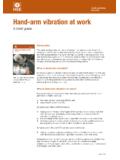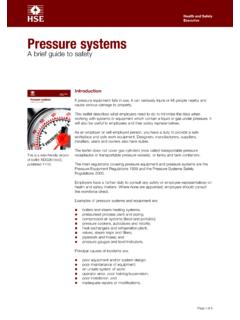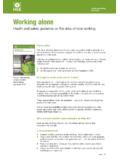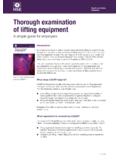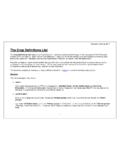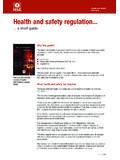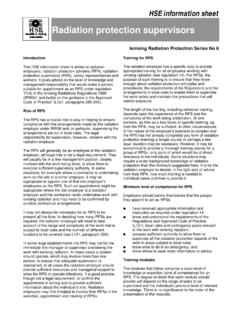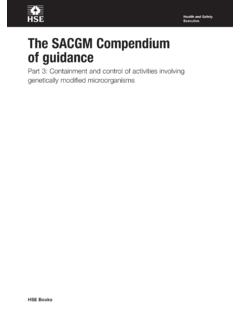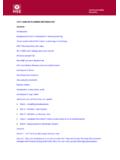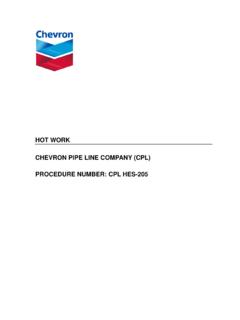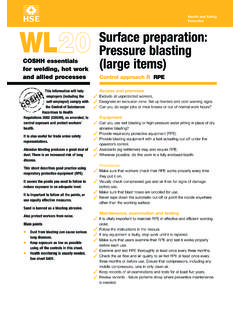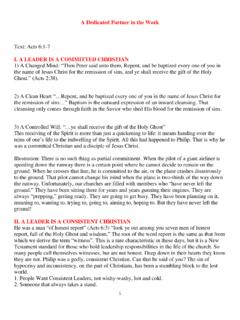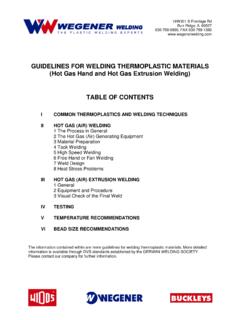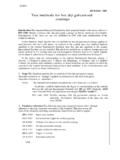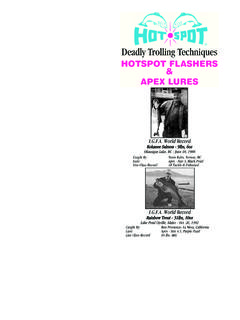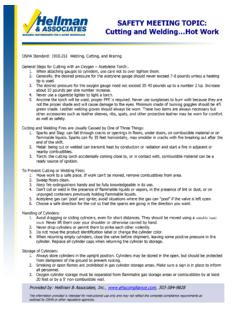Transcription of Hot work in docks - Health and Safety Executive
1 Health and SafetyExecutiveHealth and Safety Executive Hotworkin docks HSEinformation sheet This information sheet is one of a series issued by the Transportation Section of HSE s Services, Transportation and Safety Unit. It gives guidance to dock and harbour authorities, terminal operators, contractors, ship s masters and all other people carrying out hot work , on the precautions that should be taken in connection with hot work at docks and on ships in them. It is not intended to apply to hot work carried out in shipyards.
2 Introduction Over the years hot work in docks , both on ships and onshore, has resulted in many serious fires and explosions that have caused death and serious injuries. As long ago as 1847, the legislation relating to docks and harbours was consolidated in the Harbours, docks and Piers Clauses Act 1847. The Act contains standard clauses which can be deemed to be included in Acts relating to specific harbours, docks and piers. Many such Acts and bye laws made under them are still in force today. The 1847 Act included powers for dock authorities to make bye laws for regulating the use of fires and lights in dock premises, and on board ships in docks .
3 The Approved Code of Practice to the Dangerous Substances in Harbour Areas Regulations 1987 and a number of internationally recognised publications also advise or require that hot work which may constitute a hazard due to the presence of dangerous cargo should only be carried out in docks or on ships in docks with the permission or authorisation of the harbour authority. Many authorities have used these powers to make bye laws which relate to hot work . Hot work Hot work means the use of open fires, flames and work involving the application of heat by means of tools or equipment.
4 This includes the unintentional application of heat, for example by the use of power tools or hot rivets or hot particles from cutting or welding operations, falling onto and igniting flammable material or flammable vapours. () docks Information Sheet No 6 RevisedA lot of hot work at docks is undertaken in connection with construction, maintenance or repair operations. On ships in docks hot work may be carried out in connection with routine maintenance or voyage repairs and some cargo handling operations, eg the fitting and removal of guide bars to prevent snagging on the cleats of hatch covers.
5 Responsibilities Most hot work operations involve a number of people, all of whom have responsibilities for ensuring that the work is carried out safely. Too often incidents have occurred when people have assumed they had no responsibility for taking the necessary Safety precautions to ensure hot work was carried out safely, because someone else agreed to the work . This is not so. The Management of Health and Safety at work Regulations 1999 require all employers and self employed people involved in hot work to make a suitable and sufficient assessment of the risks from proposed hot work to the Health and Safety of their employees and any others who may be affected by it.
6 In addition, all such employers and self employed people should liaise and co operate to ensure that appropriate precautions are taken and any necessary information is exchanged. The responsibilities of those likely to be involved are set out below. Dockand harbour authorities and terminal operators should decide what controls of hot work are necessary in their premises and to what extent it is appropriate for them to use their powers to make bye laws. Authorities should bring the requirements of any such bye laws to the notice of those with potential duties under them and enforce the bye laws where necessary.
7 It is particularly important that the masters of visiting ships are informed of the procedures to be followed while their ships are in the dock , harbour or terminal, 1 of 5 pages Health and Safety Executive and understand them. The requirements of bye laws should be clear to all concerned. They should also be periodically reviewed and revised as necessary. Individualemployers of people carrying out hot work in docks should ensure that all necessary precautions for the protection of everyone that may be affected by it are taken.
8 In many cases this will involve the use of permit to work systems. Often responsibilities will be shared. It should not be assumed that because someone else has agreed that hot work may be carried out, all necessary precautions will be taken by them. Sometimes contractors may be in direct control of the hot work and have the prime responsibility for ensuring that all necessary precautions are taken. Employers who contract others to carry out hot work on their behalf should ensure that the contractors are competent to carry out the work safely and do so.
9 It is essentialthat thereis no doubtas to who has overallcontrolof the work . Masters ofships have the prime responsibility for the Safety of their ship and all on board. No hot work should be carried out on board a ship in a dock without permission in writing from the master or other responsible officer or owner s superintendent if the ship is not manned by the regular crew, and from the dock or harbour authority and anyone else involved. If the master or other officer agrees to the carrying out of hot work by shore personnel, they should draw the attention of such personnel to any relevant hazards and steps taken to ensure that any necessary precautions are taken.
10 This should be in addition to action taken by anyone else involved. dock and harbour authority permission dock and harbour authorities should identify those areas of their premises or circumstances in which it is necessary for permission to be given by them before hot work is carried out. Permission on each individual occasion may not be necessary, eg in connection with work regularly carried out in workshops or in areas where hot work is unlikely to affect ships or cargoes, in the dock premises. It may be appropriate for such permission to be included in a permit to work setting out the necessary precautions.
